
Helene Bertha Amalie "Leni" Riefenstahl was a German film director, photographer and actress known for producing Nazi propaganda.
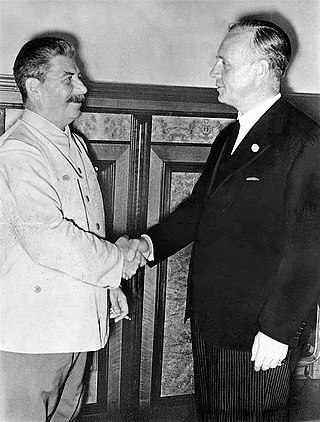
The Molotov–Ribbentrop Pact, officially the Treaty of Non-Aggression between Germany and the Union of Soviet Socialist Republics, and also known as the Hitler–Stalin Pact and the Nazi–Soviet Pact, was a non-aggression pact between Nazi Germany and the Soviet Union, with a secret protocol establishing Soviet and German spheres of influence across Northern Europe. The pact was signed in Moscow on 23 August 1939 by German Foreign Minister Joachim von Ribbentrop and Soviet Foreign Minister Vyacheslav Molotov.

The Life of Emile Zola is a 1937 American biographical film about the 19th-century French author Émile Zola starring Paul Muni and directed by William Dieterle.

The Great Dictator is a 1940 American anti-war, political satire, and black comedy film written, directed, produced, scored by, and starring British comedian Charlie Chaplin, following the tradition of many of his other films. Having been the only Hollywood filmmaker to continue to make silent films well into the period of sound films, Chaplin made this his first true sound film.

Christopher McQuarrie is an American filmmaker. He received the BAFTA Award, Independent Spirit Award, and Academy Award for Best Original Screenplay for the neo-noir mystery film The Usual Suspects (1995).

Inside the Third Reich is a memoir written by Albert Speer, the Nazi Minister of Armaments from 1942 to 1945, serving as Adolf Hitler's main architect before this period. It is considered to be one of the most detailed descriptions of the inner workings and leadership of Nazi Germany, but is controversial because of Speer's lack of discussion of Nazi atrocities and questions regarding his degree of awareness or involvement with them. First published in 1969, it appeared in English translation in 1970.
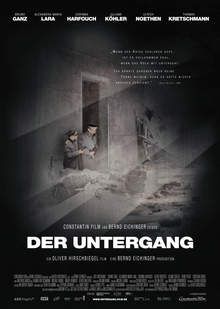
Downfall is a 2004 historical war drama film written and produced by Bernd Eichinger and directed by Oliver Hirschbiegel. It is set during the Battle of Berlin in World War II, when Nazi Germany is on the verge of total defeat, and depicts the final days of Adolf Hitler. The cast includes Alexandra Maria Lara, Corinna Harfouch, Ulrich Matthes, Juliane Köhler, Heino Ferch, Christian Berkel, Alexander Held, Matthias Habich, and Thomas Kretschmann. The film is a German-Austrian-Italian co-production.

The Meaning of Hitler is a 1978 book by the journalist and writer Raimund Pretzel, who published all his books under the pseudonym Sebastian Haffner. Journalist and military historian Sir Max Hastings called it 'among the best' studies of Hitler; Edward Crankshaw called it a 'quite dazzlingly brilliant analysis'.

Claudia Ann Koonz is an American historian of Nazi Germany. Koonz's critique of the role of women during the Nazi era, from a feminist perspective, has become a subject of much debate and research in itself. She is a recipient of the PEN New England Award, and a National Book Award finalist. Koonz has appeared on the podcasts Holocaust, hosted by University of California Television, and Real Dictators, hosted by Paul McGann. In the months before the 2020 United States presidential election, Koonz wrote about the risks of autocracy in the United States for History News Network and the New School's Public Seminar.

Defiance is a 2008 American war film directed by Edward Zwick, and starring Daniel Craig as Tuvia Bielski, Liev Schreiber as Zus Bielski, Jamie Bell as Asael Bielski, and George MacKay as Aron Bielski. Set during the occupation of Belarus by Nazi Germany, the film's screenplay by Clayton Frohman and Zwick was based on Nechama Tec's 1993 book Defiance: The Bielski Partisans, an account of the eponymous group led by Polish Jewish brothers who saved and recruited Jews in Belarus during World War II.

The Nazi gun control argument is the claim that gun regulations in Nazi Germany helped facilitate the rise of the Nazis and the Holocaust. Historians and fact-checkers have characterized the argument as dubious or false, and point out that Jews were under 1% of the population and that it would be unrealistic for such a small population to defend themselves even if they were armed.

The Transfer Agreement: The Dramatic Story of the Pact Between the Third Reich and Jewish Palestine is a book written by author Edwin Black, documenting the transfer agreement between Zionist organizations and Nazi Germany to transfer a number of Jews and their assets to Palestine.

James Holland is an English popular historian, author and broadcaster, who specialises in the history of the Second World War.
Richard David Breitman is an American historian best known for his study of The Holocaust.
The Roman Catholic Church suffered persecution in Nazi Germany. The Nazis claimed jurisdiction over all collective and social activity. Clergy were watched closely, and frequently denounced, arrested and sent to Nazi concentration camps. Welfare institutions were interfered with or transferred to state control. Catholic schools, press, trade unions, political parties and youth leagues were eradicated. Anti-Catholic propaganda and "morality" trials were staged. Monasteries and convents were targeted for expropriation. Prominent Catholic lay leaders were murdered, and thousands of Catholic activists were arrested.
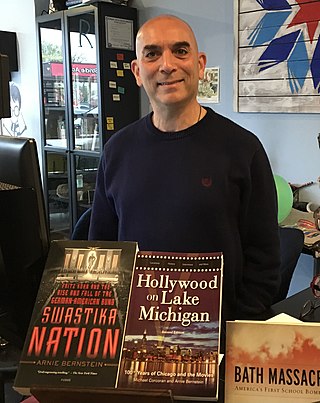
Arnie Bernstein is an American writer of historical nonfiction. His works include Bath Massacre: America’s First School Bombing and Swastika Nation: Fritz Kuhn and the Rise and Fall of the German-American Bund.
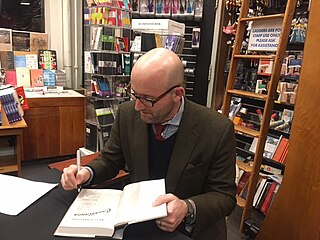
Noah William Isenberg is an American film scholar and historian. Isenberg is currently the Charles Sapp Centennial Professor and former Chair of the Department of Radio-Television-Film at The University of Texas at Austin. He previously served as Professor of Culture and Media at Eugene Lang College, where he was also the founding director of the Screen Studies program. Isenberg received his BA in History from the University of Pennsylvania, his MA in German Literature from the University of Washington and his PhD in German Studies from the University of California at Berkeley.

Jojo Rabbit is a 2019 political satire comedy-drama film written and directed by Taika Waititi, adapted from Christine Leunens's 2008 book Caging Skies. Roman Griffin Davis portrays the title character, Johannes "Jojo" Betzler, a ten-year-old Hitler Youth member who finds out that his mother is hiding a Jewish girl in their attic. He must then question his beliefs while dealing with the intervention of his imaginary friend, a fanciful version of Adolf Hitler with a comedic stance on the politics of the war. The film also stars Sam Rockwell, Rebel Wilson, Stephen Merchant, and Alfie Allen.

Speer Goes to Hollywood is a 2020 Israeli documentary by director Vanessa Lapa, starring Albert Speer. The film premiered at the Berlin International Film Festival in February 2020 as part of the Berlinale Special. The Israeli premiere took place as part of the official competition of the Jerusalem Film Festival 2021, where Lapa won the Diamond Award for directing. The American premiere took place at the Telluride Film Festival in Colorado. The film won the Best Documentary by the Israeli Academy - Ophir Award for the year 2021.
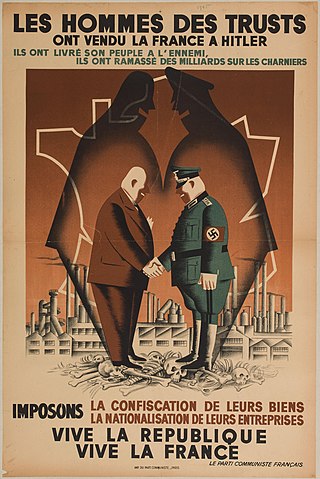
A number of international companies have been accused of having collaborated with Nazi Germany before their home countries' entry into World War II, though it has been debated whether the term "collaboration" is applicable to business dealings outside the context of overt war. Accused companies include General Motors, IT&T, and Eastman Kodak.


















